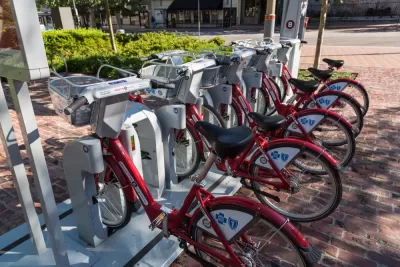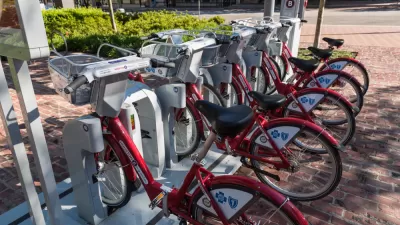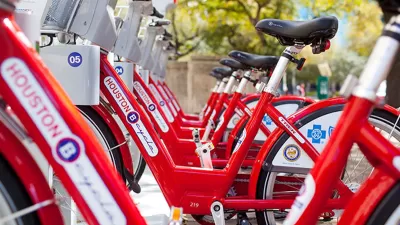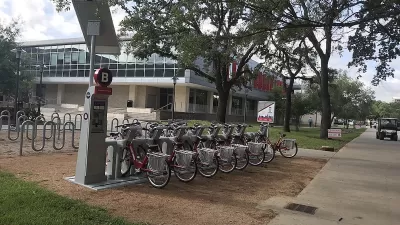Metro plans to invest half a million dollars in the city’s bike share system to improve connectivity to buses and trains.

According to the Houston Chronicle’s Dug Begley, the region’s Metropolitan Transit Authority could take over Houston’s bike share system. The change could boost efforts to better integrate bike share into the city’s public transit system and provide efficient options for multimodal transportation in more neighborhoods. “The proposal would give the nonprofit and Metro six to nine months to work together on the system and then have Metro officials develop a plan for continuing the bike sharing initiative.”
The system was launched in 2012 and has grown to almost 1,000 bikes and e-bikes and 153 stations. More recently, its future has been under question, with half of stations closed in November to cut costs during the winter. “The hope, At-large Houston City Councilmember Sallie Alcorn said, is that Metro adds to and does not subtract from what already is available and popular with users.” Meanwhile, the agency plans to examine how it can more equitably distribute bikes and stations to neighborhoods that have been overlooked. Sprawling, auto-oriented Houston is building out its bike infrastructure, making an ambitious pledge to add thousands of miles of bike lanes and trails.
FULL STORY: Metro could take over Houston's BCycle, spending $500K to help people get to bus and train stops

Manufactured Crisis: Losing the Nation’s Largest Source of Unsubsidized Affordable Housing
Manufactured housing communities have long been an affordable housing option for millions of people living in the U.S., but that affordability is disappearing rapidly. How did we get here?

Americans May Be Stuck — But Why?
Americans are moving a lot less than they once did, and that is a problem. While Yoni Applebaum, in his highly-publicized article Stuck, gets the reasons badly wrong, it's still important to ask: why are we moving so much less than before?

Research Shows More Roads = More Driving
A national study shows, once again, that increasing road supply induces additional vehicle travel, particularly over the long run.

Judge Halts Enforcement of Anti-Homeless Laws in Grants Pass
The Oregon city will be barred from enforcing two ordinances that prosecute unhoused residents until it increases capacity and accessibility at designated camping sites.

Advancing Sustainability in Los Angeles County Schools
The Los Angeles County Office of Education’s Green Schools Symposium brings together educators, students, and experts to advance sustainability in schools through innovative design, climate resilience strategies, and collaborative learning.

Using Old Oil and Gas Wells for Green Energy Storage
Penn State researchers have found that repurposing abandoned oil and gas wells for geothermal-assisted compressed-air energy storage can boost efficiency, reduce environmental risks, and support clean energy and job transitions.
Urban Design for Planners 1: Software Tools
This six-course series explores essential urban design concepts using open source software and equips planners with the tools they need to participate fully in the urban design process.
Planning for Universal Design
Learn the tools for implementing Universal Design in planning regulations.
City of Moreno Valley
Institute for Housing and Urban Development Studies (IHS)
City of Grandview
Harvard GSD Executive Education
NYU Wagner Graduate School of Public Service
City of Cambridge, Maryland
Newport County Development Council: Connect Greater Newport





























